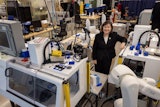Manufacturing Business Technology recently sat down with IQMS president and CEO Gary Nemmers to discuss some of the trends happening in manufacturing and ERP adoption.
ALSO SEE: How Food Manufacturers can Reduce Waste and Save Money with ERP
Manufacturing Business Technology: What are some of the trends happening in the manufacturing industry right now, both good and bad?
Gary Nemmers: One obvious trend that we have seen repeatedly from American manufacturers is that business is good. Our customers are thriving and cite their biggest challenge as meeting increased demand, followed by the need to maintain quality products in light of the additional work.
To meet demand, our manufacturers are hiring, running multiple shifts and even operating on the weekends. Unfortunately, hiring qualified employees and employee retention are issues. We have seen a lot of our manufacturers, when faced with an increase in capacity and hiring restraints, turn to shop floor automation as a long-term solution.
MBT: Where do you see manufacturers making the largest investments right now?
Nemmers: IQMS is in the software business, so we view manufacturing through that lens. That being said, we have seen a lot of IT software and hardware investment to ramp up capacity and quality. For some, that means moving beyond QuickBooks and investing in their first ERP solution, while for others, it is the replacement of a legacy ERP system that no longer supports their growth.
Regardless of their level of software sophistication, nearly every manufacturer we meet is seeking ways to “do more with less” as they better track productivity, maintain product lifecycle management (especially in the automotive, medical, aerospace and food and beverage industries, where excellent product change management is required) and view quality KPIs.
MBT: According to the 2015 Manufacturing Survey from Sikich LLP, a majority of top manufacturers still rely on spreadsheets and other manual processes instead of business management software. 53 percent of those polled used manual processes to measure key performance indicators, compared to just 26 percent that used applications such as ERP systems. Why do you think so many manufacturers are still using antiquated means to run their business?
Nemmers: On a business count-basis, it may be that only 26 percent of manufacturers run ERP, as there are many small businesses that operate with spreadsheets and QuickBooks, as well as whole departments in larger companies that use spreadsheets to fill information gaps in between departments. But on a dollar-basis, the lion’s share of manufacturing runs on ERP. We have found that spreadsheets and QuickBooks will work for a while for small manufacturers, but to truly grow to the next business level, you need a more sophisticated business management solution.
An interesting question that the survey did not address is, “why do so many businesses that have ERP still use spreadsheets to create KPIs?” The answer is because manufacturers who are running on older ERP systems or proprietary, in-house systems do not have the native manufacturing execution systems (MES) and business intelligence and quality assurance tools that can support the metrics they need. With legacy or custom systems made up of bolted together disparate programs, the manufacturer has to export the data from multiple places in spreadsheets and massage the data into the reports they need.
MBT: Why are ERP systems essential to manufacturing success today? What can they do for a company?
Nemmers: Being a competitive manufacturer in North America means minimizing labor costs and data misunderstandings, while maximizing quality. If you can build it here for a fair price, while also delivering high service levels and outstanding quality, you will win and keep the business. Typically, that level of service means automation, and ERP software automates manufacturing, administrative record keeping and reporting. From the front office to the shop floor, ERP software automates processes by taking labor out of the equation and instead building in repeatable quality. Good ERP software can optimize your capital equipment utilization, while reducing labor, inventory, WIP and scrap expenses.
MBT: What are some of the hurdles manufacturers face in moving to an ERP system? What advice would you give them to overcome those obstacles?
Nemmers: The biggest hurdle companies face when moving into a new ERP is change management. Often, the ERP decision is made by a small group of progressive-minded leaders at a company. Getting the entire team on board to go the extra mile and working with the ERP implementation team (while still also performing their regular jobs) is essential. Getting buy-in from everyone to learn the system, use the system and leave the old procedures behind is what makes for a successful implementation. The best implementations we witness are the ones with the support and commitment from senior leaders and a strong internal project management team that works closely with the software vendor’s trainers and implementers.
MBT: Where do you see the future of ERP systems for manufacturers?
Nemmers: More quality and compliance tracking. More than ever, manufacturers are being held liable for product quality and liability. It started in the medical and food and beverage industries and is spreading rapidly through automotive and consumer goods. Both customers and regulators are insisting that manufactures be able to document product traceability all the way back to the raw materials. ERP systems are the logical system of record for all those events and we are seeing ERP as a compliance tool becoming more and more relevant.
The future of ERP systems also includes more automation. Thanks to the adoption of the Internet of Things (IoT) in manufacturing, every day we are seeing more and more manufacturing performed by automated systems. ERP is at the heart of that automation, as all the connected shop floor devices report back to the ERP for collection, tracking, instruction and analysis.
One additional tool that a comprehensive, modern ERP system built around manufacturing business requirements provides is up-to-the-minute product costing and profitability analysis. Having the visibility of real-time, actual costing (in comparison to standard costing) on a customer, product line, work cell or production run basis is powerful information as manufacturers decide growth strategies and make plans to maximize ROI and profits.























